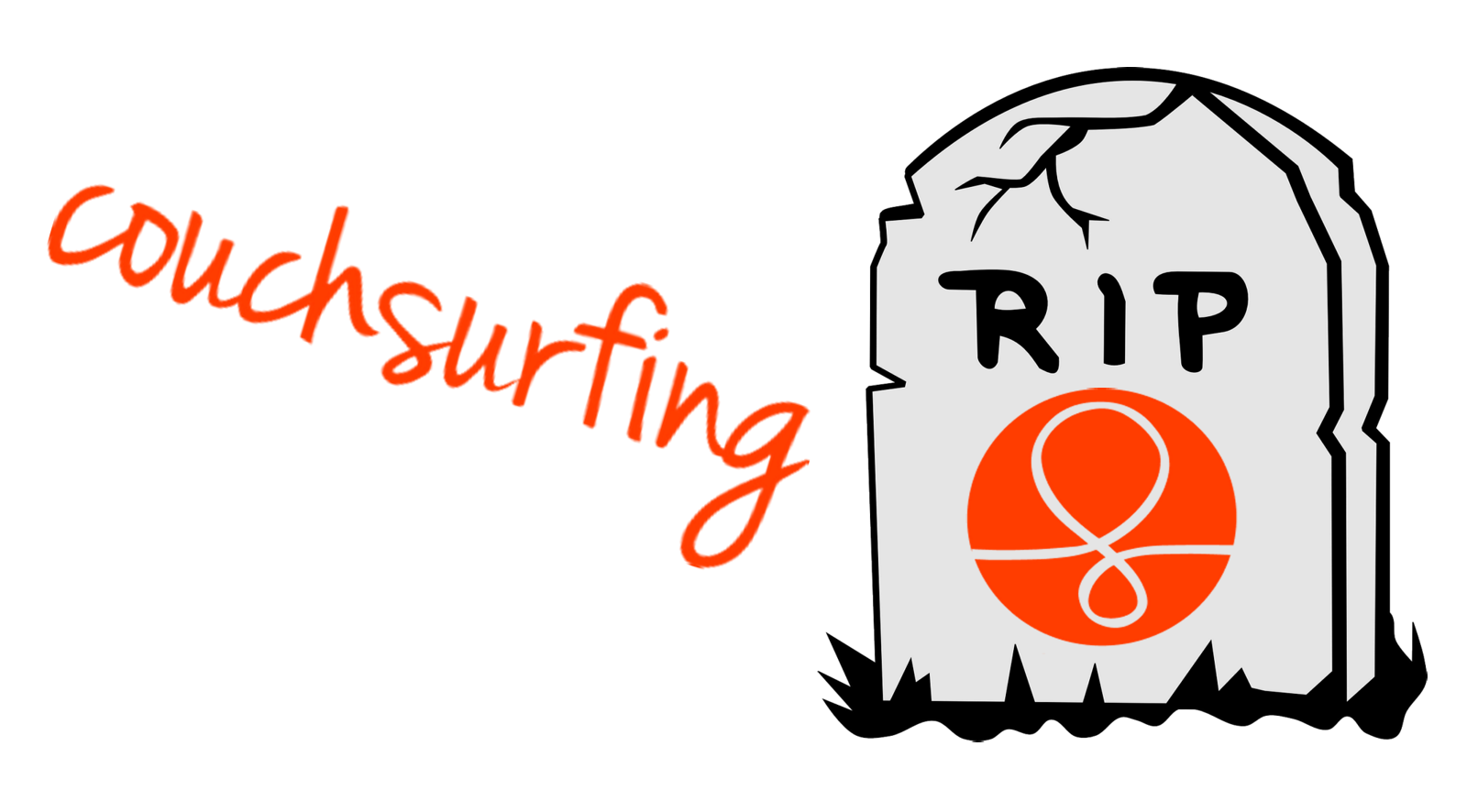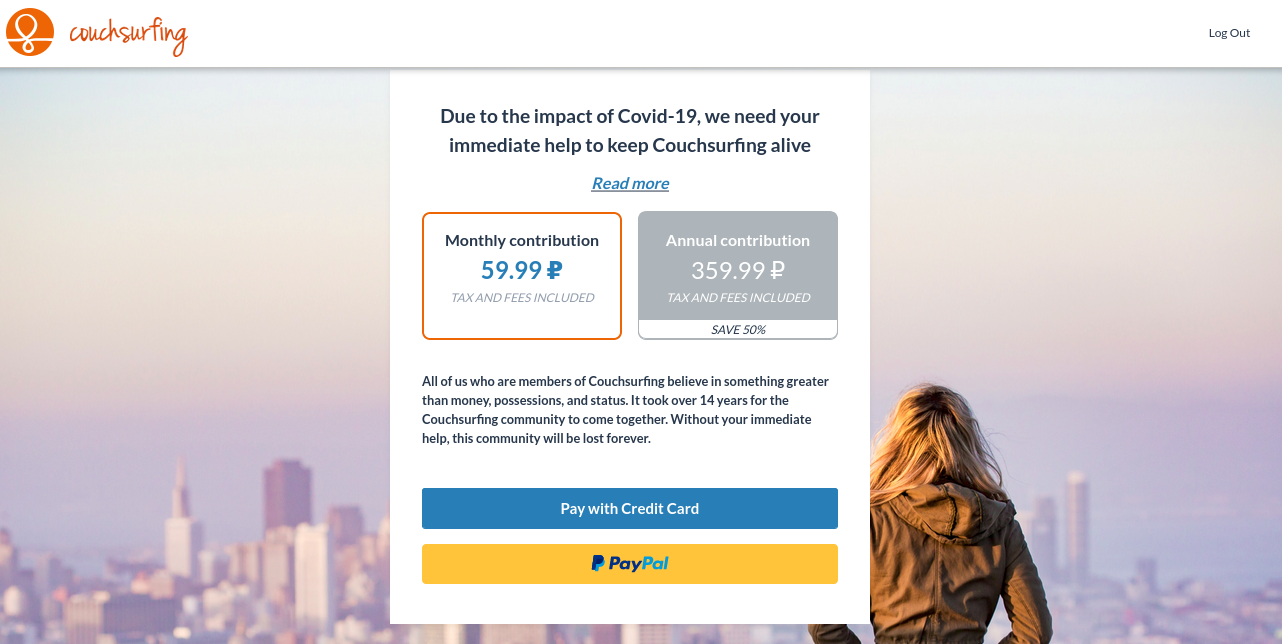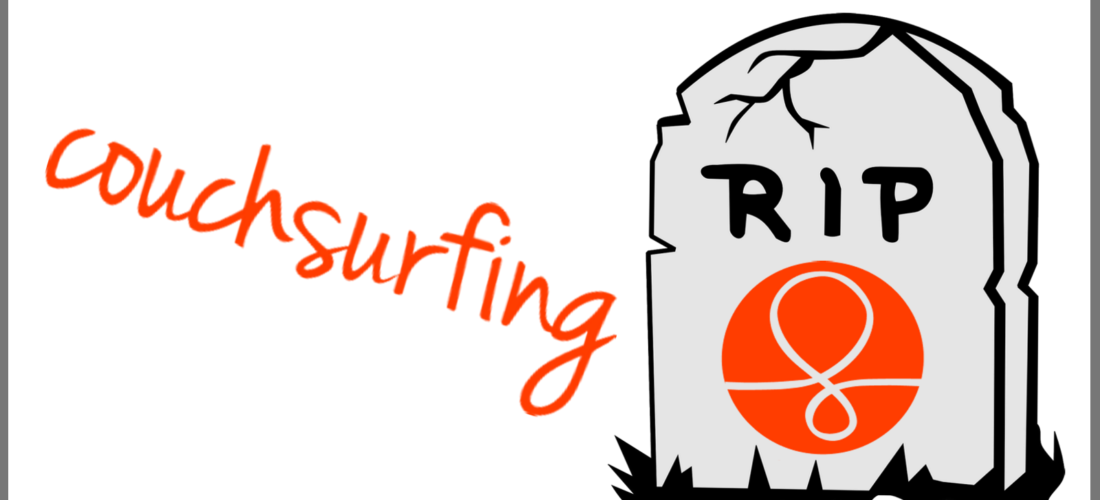
Couchsurfing- the Idea
The idea behind Couchsurfing is great:
– If I live somewhere on Earth and I would like to host travelers at my place, I can make a profile and offer my space. The space can be a couch, a room, a hammock, a tent, the backyard, the floor, whatever- you specify what you have to offer.
Why would I offer my space for free? – To meet travelers and like-minded people. To join the community. To do something nice, etc. :)
– If I am traveling somewhere and I don’t want to stay in a hotel or hostel, I can search through Couchsurfing to see if there is someone available to host me. If I find a host that I would like to stay with, I will send them a message or a “couchsurfing request.” If they respond with a “yes,” I will stay with them for the amount of time that I specified in the message or request.
What if they want to rape you or something? Couchsurfing has a reference system. Once a surfer stays with a host, both people leave a reference.
As a general rule, I don’t stay with people who have few references or only have references from hot young chicks, even if all of those references are positive. I read through the host’s profile and references to have a good idea of who I am sending a request to.
The most important aspect of couchsurfing is that it should be trade-free. This means that when a host offers their couch, they should not expect money, gifts, labor, naked pictures or anything in exchange for the couch. The surfer should, of course, be respectful to their host and understand that they do not provide a “service” but a helping hand to them.
– You were also able to create events and meet-ups through couchsurfing.com. This used to be a great way to meet like-minded people.
Personal Experience
I was a huge fan of Couchsurfing for a long time. I joined in 2010. I hosted in Australia, Indonesia, the US and Russia. I surfed in Spain, New Zealand, the US, Mexico, Bulgaria, Malaysia, Sri Lanka, Russia, Mongolia and Germany.
I hosted Couchsurfing meet-ups in the US and Russia and have joined dozens of meet-ups all over the world. I’ve met hundreds of wonderful people through Couchsurfing and have had amazing experiences with many of them. I met great friends, and even sailed across the Caribbean and along the North Island of New Zealand because of Couchsurfing.
I was amazed by the kindness that complete strangers showed me. And I realized that this kindness was contagious- it made me want to give back whenever I had the chance.
Couchsurfing gave me hope that maybe this world is not that bad after all :)

So What Happened?
When Couchsurfing International Inc. launched in 2003, it was a domestic nonprofit and the website was run by volunteers, but in 2011, they decided to turn it into a For-Profit corporation.
For-profit? Yes, so they profit off of people who simply want to help each other out for free. I offer you a free place to sleep. You accept. We are kind and genuine. Couchsurfing International, Inc. figures out ways to profit off of this.
They published a blog in 2011 saying that they were proud of becoming a company, that they will stick to their core values, and that “CouchSurfing will never make you pay to host and surf.”

By 2012, Couchsurfing raised $22.6 million through investors.
Remember, when investors invest, they expect to get that money back plus a lot more.
A lot of couchsurfing members were upset about this turn of events, saying that becoming “for-profit” goes against the entire idea of couchsurfing and against the values of the community. As a result, the company decided to spend over $10,000 on “public relations” to educate its directors on how to respond to the public about this dilemma.
For me, the change wasn’t super noticeable at first. I really didn’t like the idea of couchsurfing becoming a for-profit company, but at least in the beginning, I still had access to everything I needed on couchsurfing. I surfed, hosted and created/attended meet-ups all over the world.
I noticed that the website changed from time to time, and in my opinion, it became worse every time they updated it. I never wanted or needed any fancy apps or features, the only thing that was important on Couchsurfing was to be able to connect hosts with surfers and to have a reference system. This is simple and it worked fine back in 2010.
So how does Couchsurfing make money?
1. Advertisement.
2. Probably through “sharing” data.
Couchsurfing says:
“We did not sell your data. We would not feel comfortable doing this. We think this is unethical. We did not do this. We will never do this. There are mentions on various social media channels of Couchsurfing selling member data. So we will say this once more, we have not and will not do this.”
But Google also claims that they don’t “sell” your data.
Here’s an article that explains how Google gets away with claiming that they don’t “sell” your data, but manages to make billions of dollars by “sharing” your data and “engaging” with third parties.
Interestingly, this is the same language that Couchsurfing uses in their privacy policy:
“We may engage a third party data provider who may collect web log data from you or place or recognize a unique cookie on your browser.”
“We may also share aggregated or de-identified information, which cannot reasonably be used to identify you.”
“We will not share information about you with outside parties except […]
-With third party vendors, consultants and other service providers who need access to such information to carry out their work for us.”
You can read their privacy policy yourself and try to figure out what they may or may not do with your data.
3. “Verification.”
The "Verification" Scam
If you want to be “verified” on Couchsurfing, all you have to do is pay money ($59.00, maybe more or less, depending on where you live/ how long you want to be verified for), give them an address, then they “verify” the address and give you a “verified” badge!
They made it sound like this was such a “great thing” that would make the community safer, but in reality it was just a money-making scheme.
The truth is that paying money to Couchsurfing does not make the community safer, in fact it could make it more dangerous.
Why? Well because any creep-o can “verify” themselves and then use couchsurfing to invite unsuspecting girls or boys to their place. Since the creep-o will have a little green “verification” badge, these girls and boys (especially new users) might think that this person is totally safe to stay with even if they have no references, or very few references.
Paying money to Couchsurfing does not in any way prove that you are not a creep. -That’s why the verification system is bullshit, and nothing more than a money-making scheme. What’s important are the references, not the fact that you have money or that you’ve provided this company with some address.

The “verification” scam pissed a lot of people off, but in 2017, Couchsurfing went the extra mile and started restricting users who were not “verified.”
Now they said that they will limit you to only “10 introductions” per week if you are not verified.
This means that if you do not pay money to Couchsurfing, you cannot send more than 10 messages or request per week.
Again, they framed this as if it was good for the community, saying that this will make surfers send more meaningful requests to their potential hosts. -But this is complete bullshit, because if that was the truth, then why not limit everybody, rather than just the people that didn’t pay?
So this was a really shitty move but it worked for the company! It forced a lot of people to pay. Sending only 10 messages per week is very limiting, especially if you’re visiting big cities or if you visit more than one city per week (which a lot of couchsurfers do).
I never paid and will never pay Couchsurfing in any way. From 2017 on, I mostly used Couchsurfing to host and create meet-ups, but now I regret even that.
The Last Straw
On May 14, 2020, Couchsurfing imposed a mandatory monthly or yearly fee to use the website. They gave no warning to their users and cut off all access to the user’s own profiles.
Now, you cannot log in to your profile, you can’t get or see your own photos, your references, your contacts, messages or anything else unless you pay Couchsurfing.
When I go to couchsurfing.com all I can see is this:

I cannot access my profile at all.
Funny how they promised that “CouchSurfing will never make you pay to host and surf” back in 2011.
Like I said, there was no warning about this, and now I can’t even contact some great people that I’ve met through Couchsurfing in the past. I also can’t delete my profile or even request a portable copy of my data through the link they provide.

When I click on that link it takes me to the “pay here” button and there is no other option there.
This is sad, but predictable. This is what for-profit corporations do. They don’t care about their users or the community, their primary (if not only) concern will always be profit.
What really makes me sick though is how these companies frame their actions.
Remember that $10,000 “public relations” training? -Surely that was a good investment.
Right on the main page, where I can’t access my profile unless I pay money, it says: “All of us who are members of Couchsurfing believe in something greater than money, possessions, and status.” -This is why we make it mandatory to pay to access your profile! And why we didn’t even warn you about this! :D
Even people that had paid for a “lifetime” verification will have to pay this fee after one year if they want to use Couchsurfing. Hosts that only use Couchsurfing to let people stay at their home for free also have to pay.
Oh but they say, “Your contribution will enable those in “unbanked” and developing countries to maintain free access to the Couchsurfing community. The diversity of the Couchsurfing community is what unites us. It is imperative, especially during crises such as the COVID-19 pandemic, that we demonstrate compassion and inclusion to those who may be economically unable to participate.“
This is nothing but more “public relations” training put to use. If you’re so compassionate and inclusive, then why not also care about those who live in “developed” countries but are economically unable to participate? There are plenty of very poor people all over the world, you know.
Plus, it’s also more practical for them not to charge hosts from “developing” countries. Obviously most people in very poor countries aren’t going to pay, so in order for Couchsurfing to be a successful business, they need to keep their “global diversity.”
Please don’t believe any for-profit company when they say that they care about you :)
In their blog, Couchsurfing framed this sudden change like this: “Poor us, we love you all and we need your help because of the pandemic!” But if you de-code the $10,000-public-relations-training language, what they really mean is, We’re not making enough money from you by advertising shit, collecting your data and scamming you with our “verification” scheme- so we need to force you to give us money now.
If Couchsurfing was not a for-profit company, they wouldn’t be suffering from the pandemic in the first place. Fewer people would use the website now and that would be fine. Their servers would have less requests to deal with because fewer users would send each other messages, upload photos, search and overall visit the website. This would not be a problem if Couchsurfing was not looking to make money off of its users.
Many (including myself) would be happy to donate to Couchsurfing if it was a genuine and honest (not profit-orientated) organization. And I am sure that many volunteers would help maintain the website.
If Wikipedia, Trustroots and BeWelcome can work without being a for-profit business, surely Couchsurfing could have done it too.
But that’s not their aim! Couchsurfing is more like Facebook than it is like Trustroots, BeWelcome or Wikipedia.
And just like bilionaire Zuckie cares less about a “better world” than he does about his $76.4 billion, I am sure that the CEO and others who work for Couchsurfing International Inc. would never even consider hosting a couchsurfer at their precious homes :).
"We Hear You"
Obviously, many Couchsurfing members were very upset about this sudden change, so Couchsurfing responded to the users with yet another smart “poor us” public relations blog called “We Hear You.”
They “sincerely” apologized for not warning their users about the change, saying that “sending millions of emails out to the community is not a simple feat.”
-As if you need to send individual users an email one-by-one?! Why not post a message on your website, just like you posted the “PAY HERE” message? :D Or send a newsletter? Or Write a blog? Or all of that?
Oh and then on June 5th, they sent me an email asking for money!
The rest of this public relations blog is a bunch of bla-bla-bla about how wonderful they are and how they use this money to improve Couchsurfing. They even said that they spent up to $40,000 per month on Google Maps at one point!! :D
I’m sure that Couchsurfing did invest a lot of money into their website, but don’t forget that this is done so they could grow the community and profit off of it. Those expensive maps probably collected lot of your data so don’t believe the “We’re so wonderful, we made all of these great expensive improvements to the website so that your experience is better!”
If Couchsurfing actually “heard us,” they would at the very least give us access to our profiles, so please don’t believe their “public relations” talk.
Instead, let’s just say good-bye to couchsurfing.com and switch to an alternative platform.

Couchsurfing Alternatives
Whenever you use a service, you should always ask the question, “What am I trading?“
To use Couchsurfing you clearly need to trade money. You also have to trade your data and you have to look at ads.
Are there trade-free alternatives?!
Yes! I found two that seem to be great! (Feel free to suggest other alternatives in the comments below).
1. BeWelcome
BeWelcome is a project of the French non-profit association “BeVolunteer.” It has all of the important features of Couchsurfing (connecting hosts with surfers, it includes references, groups, activities, discussions -and even a MAP! :D), yet it is not looking to profit off of its community. It does not feed you ads, sell your data, ask for a fee or any other trade.
BeWelcome is run by volunteers and raises the funds they need to pay for the project’s maintenance costs through donations. Their finances are transparent.
2. Trustroots
Trustroots is another great platform with a big MAP! :) And I’m sure they don’t pay $40,000 for it!
They don’t have a reference system yet, but they are working on it. Many Trustroots profiles are linked to Couchsurfing. This may be a problem now that Couchsurfing blocked its own user’s ability to access their profiles, so hopefully their own reference system will be up and running soon.
Trustroots is a UK based non-profit foundation that is run by volunteers and financed with donations. The volunteers believe that the world of sharing is being taken over by corporations that try to monetize people’s willingness to help each other, so Trustroots does not want to make a profit from its users. It does not show you ads, sell your data, ask for a fee or any other trade.
The same people that made Trustroots also created Hitchwiki, Trashwiki, and Nomadwiki.
Last Note
When Couchsurfing writes their “poor me” public relations blogs claiming that they absolutely needed all of those millions of dollars to run their platform, just take a look at some other alternatives and notice that it actually is possible to run such a project without creating a big business out of it.
The yearly donation goal of BeWelcome, for example, is €1300.
Trustroots doesn’t even have a yearly donation goal. They say, “Our costs consist mostly of servers and other technical costs. This is around € 1000 – 2000 per year and is paid by the members of the board.” Read their blog here.
Oh but what about the servers? Couchsurfing has 15 million members, while BeWelcome only has 129 thousand, and Trustroots only has 44 thousand!
Well, why don’t you ask Wikipedia how they do it then? Or Internet Archive.
Wikipedia has published more than 53 million articles and has 1.5 billion unique visitors per month. It’s a volunteer-based collaborative project that’s funded by donations and it’s trade-free: to use Wikipedia, you don’t have to trade your data, money, attention or anything else.
Internet Archive is a non-profit library of millions of free books, movies, software, music, websites, and more. It is also trade-free (and a lot more complicated than Couchsurfing).
In fact, there are thousands of great projects out there that offer all kinds of trade-free goods and services- so it is absolutely possible to create a great big project without aiming to make a profit. A few TROM volunteers recently started up a Trade-Free Directory to showcase some of these projects.
Why?
Because trade-free is the greatest form of charity :)
- You help people but ask for nothing in return.
- You create software and share it with the world without asking for their data, attention, or currencies.
- You develop a healthcare system that caters for humans without asking for anything in return.
- You create and offer, and thus you help others and yourself. Others because they will get access to trade-free goods and services, and yourself because there will be no force dragging you into “unethical” and profit-oriented behaviors.
By creating trade-free goods or services you are the utmost charitable creature there is.
A society where most of what people need and want is offered as trade-free, is a society void of most problems we see in the world today because there will be little to no incentive for people to create these problems in the first place.
I’ve added Trustroots and BeWelcome to the directory. Please feel free to contribute to this project and add more trade-free goods and services :)
** One last word of advice: If you want to switch from Couchsurfing to BeWelcome and/or Trustroots, but you don’t want to lose all of your Couchsurfing references, I would suggest archiving your reference page. If you no longer have access to your profile, then try asking a friend who still has access to archive it for you.
So- go to https://archive.fo/, paste the URL of your Couchsurfing reference page into the red box. WAIT until it loads (it might take a few minutes to save the page), then ta-dah! – A copy of your references will be saved in a different page, and anybody will be able to access it through the new URL. Here’s an example of mine.
Since I didn’t have access to my profile, I asked a friend who had been “verified” to save these pages for me. Now I can see all of my old references and I added these links to my BeWelcome and Trustroots profile. I suggest you do the same! ;)



